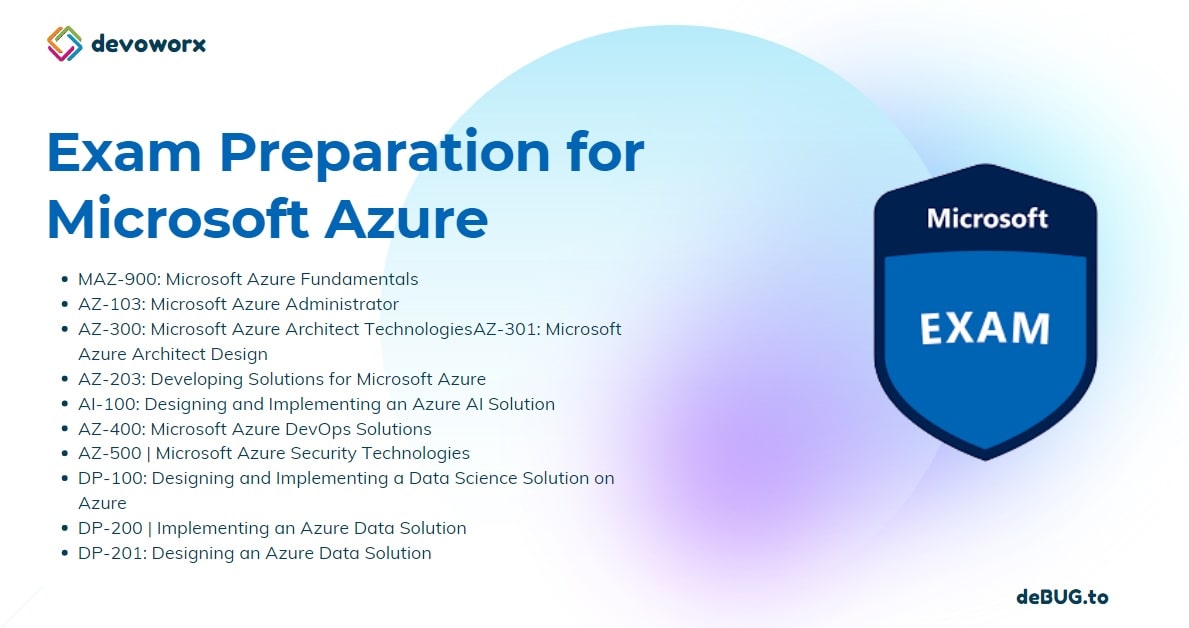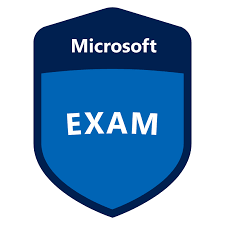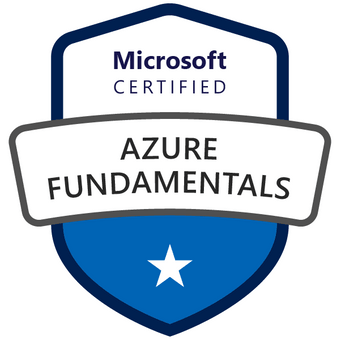
In this post, we're gonna list the exam details, new changes, and available resources that would help you to pass the Microsoft Azure exams.
- AZ-900: Microsoft Azure Fundamentals
- AZ-103: Microsoft Azure Administrator
- AZ-300: Microsoft Azure Architect Technologies
- AZ-301: Microsoft Azure Architect Design
- AZ-203: Developing Solutions for Microsoft Azure
- AI-100: Designing and Implementing an Azure AI Solution
- AZ-400: Microsoft Azure DevOps Solutions
- AZ-500 | Microsoft Azure Security Technologies
- DP-100: Designing and Implementing a Data Science Solution on Azure
- DP-200 | Implementing an Azure Data Solution
- DP-201: Designing an Azure Data Solution

Microsoft Certification 101
Before we getting started, it's recommended to watch Microsoft Certification 101 session to explore Microsoft’s certification portfolio, technology tracks, and key market trends.
You may be also interested to check Exam Preparation for Microsoft 365 Certificates.
AZ-900: Microsoft Azure Fundamentals
 This exam is designed for candidates who need to validate foundational level knowledge of cloud services and how those services are provided with Microsoft Azure.
This exam is designed for candidates who need to validate foundational level knowledge of cloud services and how those services are provided with Microsoft Azure.
The exam is intended for candidates who are just beginning to work with cloud-based solutions and services. Candidates must be prepared to demonstrate a fundamental understanding of cloud concepts, Azure services, Azure workloads, security and privacy in Azure, as well as Azure pricing and support. Candidates should be familiar with the concepts of networking, storage, compute, application support, and application development
This exam can be taken as an optional first step in learning about cloud services and how those concepts are exemplified by Microsoft Azure. It can be taken as a precursor to Microsoft Azure or Microsoft cloud services exams. While it would be a beneficial first step, validating foundational level knowledge, taking this exam is not a pre-requisite before taking any other Azure-based certifications.
This exam measures the below skills:
- Describe cloud concepts
- Describe the benefits and considerations of using cloud services
- Describe the differences between Infrastructure-as-a-Service (IaaS), Platform-as-a-Service (PaaS) and Software-as-a-Service (SaaS)
- Describe the differences between public, private and hybrid cloud models
- Describe core Azure services
- Understand the core Azure architectural components
- Describe some of the core products available in Azure
- Describe Core Solutions and Management Tools on Azure
- Describe the benefits and usage of IoT Hub, IoT Central, and Azure Sphere
- Describe the benefits and usage of Azure Synapse Analytics, HDInsight, and Azure Databricks
- Describe the benefits and usage of Azure Machine Learning, Cognitive Services and Azure Bot Service
- Describe the benefits and usage of serverless computing solutions that include Azure Functions, Logic Apps and Event Grid
- Describe solutions for software development including Azure DevOps and Azure DevTest Labs
- Describe the functionality and usage of the Azure Portal, Azure PowerShell, Azure CLI, Cloud Shell and Azure Mobile App
- Describe the functionality and usage of Azure Advisor
- Describe the functionality and usage of Azure Monitor
- Describe the functionality and usage of Azure Service Health
- Describe General Security and Network Security Features
- Describe basic features of Azure Security Center, including policy compliance, security alerts, secure score, and resource hygiene)
- Describe the functionality and usage of Key Vault
- Describe the functionality and usage of Azure Sentinel
- Describe the concept of defense in depth
- Describe the functionality and usage of Network Security Groups (NSG)
- Describe the functionality and usage of Azure Firewall
- Describe the functionality and usage of Azure DDoS protection
- Describe Identity, Governance, Privacy and Compliance Features
- Explain the difference between authentication and authorization
- Describe the functionality and usage of Azure Active Directory
- Describe the functionality and usage of Conditional Access and Multi-Factor Authentication (MFA)
- Describe the functionality and usage of Role-Based Access Control (RBAC)
- Describe the functionality and usage of Azure Policy
- Describe the functionality and usage of resource locks
- Describe the functionality and usage of tags
- Describe the functionality and usage of Azure Blueprints
- Describe the purpose of the Microsoft Privacy Statement and the Cloud Adoption Framework for Azure
- Describe the purpose of the Trust Center
- Describe the purpose of the Service Trust Portal
- Describe the purpose of Azure Sovereign Regions (Azure Government cloud services and Azure China cloud services)
- Describe Azure Pricing and Support
- Identify the factors affecting costs (resource types, services, locations, ingress, and egress traffic, reserved instances, hybrid use benefit)
- Describe the functionality and usage of the Pricing calculator and the Total Cost of Ownership (TCO) calculator
- Describe the functionality and usage of Azure Cost Management
- Describe the purpose of an Azure Service Level Agreement (SLA)
- Interpret the terms of an SLA
- Describe the service lifecycle in Azure (Public Preview and General Availability)
AZ-900: Microsoft Azure Fundamentals Resources
AZ-103: Microsoft Azure Administrator
AZ-103: Microsoft Azure Administrator is the earning criteria for Microsoft Certified: Azure Administrator Associate.
This exam for Azure Administrators who manage cloud services that span storage, security, networking, and compute cloud capabilities.
Update: AZ-104 is a new version of (AZ-103) become available on April 2, 2020. You will be able to take AZ-103 until it retires on August 31, 2020.
This exam measures the below skills:
- Manage Azure subscriptions and resources.
- Implement and manage storage.
- Deploy and manage virtual machines (VMs).
- Configure and manage virtual networks.
- Manage identities.
AZ-103: Microsoft Azure Administrator Resources
AZ-300: Microsoft Azure Architect Technologies
AZ-300: Microsoft Azure Architect Technologies exam is a part of the Microsoft Certified Azure Solutions Architect Expert certification.
This exam for Azure Solution Architects who advise stakeholders and translate business requirements into secure, scalable, and reliable solutions
Update: AZ-303 is a new version of (AZ-300) will be available on June 29, 2020. You will be able to take AZ-300 until it retires on Sept 30, 2020.
This exam measures the below skills:
- Deploy and configure infrastructure
- Implement workloads and security
- Create and deploy apps
- Implement authentication and secure data
- Develop for the cloud and for Azure storage
AZ-300: Microsoft Azure Architect Technologies Resources
AZ-301: Microsoft Azure Architect Design
AZ-301: Azure Solutions Architect Design exam is a part of the Microsoft Certified Azure Solutions Architect Expert certification.
This exam for Azure Solution Architects who advise stakeholders and translate business requirements into secure, scalable, and reliable solutions
Update: AZ-304 is a new version of (AZ-301) will be available on June 29, 2020. You will be able to take AZ-301 until it retires on Sept 30, 2020.
This exam measures the below skills:
- Determine workload requirements
- Design for identity and security
- Design a data platform solution
- Design a business continuity strategy
- Design for deployment, migration, and integration
- Design an infrastructure strategy
AZ-301: Microsoft Azure Architect Design Resources
AZ-203: Developing Solutions for Microsoft Azure
AZ-203: Developing Solutions for Microsoft Azure exam is a part of the Microsoft Certified: Azure Developer Associate.
This exam for Azure Developers who design and build cloud solutions like web and mobile apps, and they participate in all phases of development.
Update: AZ-204 is a new version of (AZ-203) become available on Feb 24, 2020. You will be able to take AZ-203 until it retires on Aug 29, 2020.
This exam measures the below skills:
- Develop Azure Infrastructure as a Service compute solution (10-15%)
- Develop Azure Platform as a Service compute solution (20-25%)
- Develop for Azure storage (15-20%)
- Implement Azure security (10-15%)
- Monitor, troubleshoot, and optimize solutions (10-15%)
- Connect to and consume Azure and third-party services (20-25%)
AZ-203: Developing Solutions for Microsoft Azure Resources
AI-100: Designing and Implementing an Azure AI Solution
AI-100: Designing and Implementing an Azure AI Solution exam is apart of Azure AI Engineer Associate certifications
This exam for Azure AI Engineers who use Cognitive Services, Machine Learning, and Knowledge Mining to architect and implement Microsoft AI solutions involving natural language processing, speech, computer vision, bots, and agents.
This exam measures the below skills:
- Analyze solution requirements
- select the processing architecture for a solution
- select the appropriate data processing technologies
- select the appropriate AI models and services
- identify components and technologies required to connect service endpoints
- identify automation requirements
- identify processes and regulations needed to conform to data privacy, protection, and regulatory requirements
- identify which users and groups have access to information and interfaces
- identify appropriate tools for a solution
- identify auditing requirements
- identify appropriate services and tools for a solution
- identify integration points with other Microsoft services
- identify storage required to store logging, bot state data, and Cognitive Services output
- Design AI solutions
- define an AI application workflow process
- design a strategy for ingest and egress data
- design the integration point between multiple workflows and pipelines
- design pipelines that use AI apps
- design pipelines that call Azure Machine Learning models
- select an AI solution that meets cost constraints
- design solutions that use vision, speech, language, knowledge, search, and anomaly detection APIs
- integrate bots and AI solutions
- design bot services that use Language Understanding (LUIS)
- design bots that integrate with channels
- integrate bots with Azure app services and Azure Application Insights
- identify whether to create a GPU, FPGA, or CPU-based solution
- identify whether to use a cloud-based, on-premises, or hybrid compute infrastructure
- select a compute solution that meets cost constraints
- define how users and applications will authenticate to AI services
- design a content moderation strategy for data usage within an AI solution
- ensure that data adheres to compliance requirements defined by your organization
- ensure appropriate governance of data
- design strategies to ensure that the solution meets data privacy regulations and industry standards
- Implement and monitor AI solutions
- develop AI pipelines
- manage the flow of data through the solution components
- implement data logging processes
- define and construct interfaces for custom AI services
- create solution endpoints
- develop streaming solutions
- configure prerequisite components and input datasets to allow the consumption of Cognitive Services APIs
- configure integration with Cognitive Services
- configure prerequisite components to allow connectivity to the Bot Framework
- implement Azure Search in a solution
- identify the differences between KPIs, reported metrics, and root causes of the differences
- identify the differences between expected and actual workflow throughput
- maintain an AI solution for continuous improvement
- monitor AI components for availability
- recommend changes to an AI solution based on performance data
AI-100: Designing and Implementing an Azure AI Solution Resources
AZ-400: Microsoft Azure DevOps Solutions
AZ-400: Microsoft Azure DevOps Solutions exam is a part of Azure DevOps Engineer Expert certifications.
This exam for DevOps professionals who combine people, processes, and technologies to continuously deliver valuable products and services that meet end-user needs and business objectives.
This exam measures the below skills:
- Design a DevOps strategy (20-25%)
- Implement DevOps development processes (20-25%)
- Implement continuous integration (10-15%)
- Implement continuous delivery (10-15%)
- Implement dependency management (5-10%)
- Implement application infrastructure (15-20%)
- Implement continuous feedback (10-15%)
AZ-400: Microsoft Azure DevOps Solutions Resources
AZ-500: Microsoft Azure Security Technologies
Microsoft Azure Security Technologies exam is a part of Microsoft Certified: Azure Security Engineer Associate
This exam for Microsoft Azure security engineers who implement security controls, maintain the security posture, manage identity and access, and protect data, applications, and networks.
This exam measures the below skills:
- Manage identity and access (20-25%)
- Implement platform protection (35-40%)
- Manage security operations (15-20%)
- Secure data and applications (30-35%)
AZ-500: Microsoft Azure Security Technologies Resources
DP-100: Designing and Implementing a Data Science Solution on Azure
Designing and Implementing a Data Science Solution on Azure exam is a part of Microsoft Certified: Azure Data Scientist Associate
This exam for Azure Data Scientist who applies their knowledge of data science and machine learning to implement and run machine learning workloads on Azure; in particular, using Azure Machine Learning Service.
Note: The exam content will be updated on May 22, 2020, check the changes at New Changes: Designing and Implementing a Data Science Solution on Azure exam
This exam measures the below skills:
- Set up an Azure Machine Learning workspace
- Run experiments and train models
- Optimize and manage models
- Deploy and consume models
DP-100: Designing and Implementing a Data Science Solution on Azure Resources
DP-200 | Implementing an Azure Data Solution
Implementing an Azure Data Solution exam is a part of Microsoft Certified: Azure Data Engineer Associate
This exam for Microsoft Azure data engineers who collaborate with business stakeholders to identify and meet the data requirements to implement data solutions that use Azure data services.
Note: The exam content will be updated on May 22, 2020, check the changes at New Changes: Exam DP-200: Implementing an Azure Data Solution
This exam measures the below skills:
- Implement data storage solutions (40-45%)
- Manage and develop data processing (25-30%)
- Monitor and optimize data solutions (30-35%)
DP-200 | Implementing an Azure Data Solution Resources
DP-201: Designing an Azure Data Solution
DP-201: Designing an Azure Data Solution exam is a part of Microsoft Certified: Azure Data Engineer Associate
This exam for Microsoft Azure data engineers who collaborate with business stakeholders to identify and meet the data requirements to implement data solutions that use Azure data services.
This exam measures the below skills:
- Design Azure data storage solutions (40-45%)
- Design data processing solutions (25-30%)
- Design for data security and compliance (25-30%)
Note: The exam content was updated on March 26, 2020, check the changes at New Changes:Exam DP-201: Designing an Azure Data Solution
DP-201: Designing an Azure Data Solution Resources
Conclusion
In conclusion, we've introduced the available resources and learning paths for the below Microsoft Azure exams:
- AZ-900: Microsoft Azure Fundamentals
- AZ-103: Microsoft Azure Administrator
- AZ-300: Microsoft Azure Architect Technologies
- AZ-301: Microsoft Azure Architect Design
- AZ-203: Developing Solutions for Microsoft Azure
- AI-100: Designing and Implementing an Azure AI Solution
- AZ-400: Microsoft Azure DevOps Solutions
- AZ-500 | Microsoft Azure Security Technologies
- DP-100: Designing and Implementing a Data Science Solution on Azure
- DP-200 | Implementing an Azure Data Solution
- DP-201: Designing an Azure Data Solution
You may also like to read
Reference